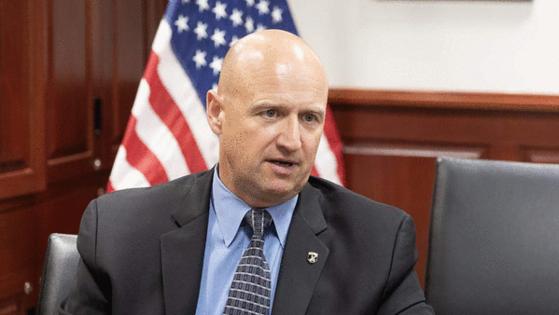Agreement with ICE gives Idaho state police broad powers. How will they be used?
Published in News & Features
The Idaho State Police’s agreement with Immigration and Customs Enforcement gives troopers broad powers, but its director, Col. Bill Gardiner, said the agency doesn’t plan to use most of its authority.
The state police signed what’s known as a 287(g) agreement with ICE in June, under the expansive Task Force Model, which has drawn racial profiling concerns. The name, 287(g) refers to a section in federal law. The model gives state troopers the ability to interrogate anyone believed to be an immigrant, arrest immigrants in certain instances, and transport immigrants to ICE.
The agreement authorizes state police to transport immigrants who have been arrested for immigration violations. At the direction of Gov. Brad Little, however, police will transport only immigrants who have just completed criminal sentences, according to Gardiner.
Gardiner said Little asked him to transport only just-released prisoners and not other immigrants, like those who had been arrested but not convicted. Gardiner attributed that to the governor’s desire to protect the local agriculture and dairy industries, which rely on immigrant labor. More people are arrested for crimes than convicted, so fewer immigrants will be transported this way.
“His whole focus has been to remove the criminals,” Gardiner said. “Well, in order to be a criminal, you need to finish your sentence.”
Transporting immigrants just released from incarceration helped solve a problem for ICE. In the past, the federal agency lacked the resources to pick up those people upon their release to deport them. Now, the state police would bring them to ICE.
If ICE started arresting students or day care workers, Gardiner said state police would have no role in that. The state police will also not raid dairies, he said.
“We’ve made the decision: We’re not doing those things,” Gardiner said Thursday in an interview at the agency’s Meridian headquarters. “We are simply giving these folks a ride.”
The governor’s office did not return a request for comment about protecting local industries.
Local groups like PODER of Idaho and the American Civil Liberties Union of Idaho have criticized the partnership between ICE and the state police.
“ICE and local law enforcement partnerships deteriorate trust, harm families and can lead to constitutional violations,” ACLU of Idaho Executive Director Leo Morales said in June in a statement. “This new partnership will intimidate and cause real trauma to our immigrant community.”
Little has aligned himself with President Donald Trump on immigration priorities and said “open border policies” hurt Idaho.
The governor signed an executive order on immigration in February to reinforce Trump’s immigration policies. Gardiner said he believed the order meant he had to reach out to ICE, so he checked with the governor’s staff to make sure, and he was told he was correct.
ICE had been pretty much “nonexistent” in Idaho for the better part of a decade, Gardiner said. He didn’t even have contact information. But ICE has an office on South Vinnell Way off Overland Road in Boise, and state police officials met with ICE officials there. The ICE officials said they needed help with detention facilities and transportation, Gardiner said.
The Idaho State Police doesn’t have any jails. But it could help with transportation. In the past, Gardiner said, ICE didn’t have the resources to pick people up, so offenders were released back into the community.
On Aug. 7, Little’s office announced the first transport. State police had helped take three immigrants from a local jail to the Elmore County Jail, an ICE-approved detention facility.
In the three weeks since, state police have transported at least 17 immigrants, including the first three, Gardiner said.
State police will typically drive immigrants, who are restrained in belly chains, to what are essentially ICE bus stops at various places throughout the state. ICE will take them by bus to Las Vegas, Gardiner said.
There are always two law enforcement officers with the immigrants. The troopers are taking time on their days off and earning overtime, according to Gardiner. Little’s office authorized up to $300,000 from his emergency fund to pay for the transports.
On Sept. 2, the Department of Homeland Security announced it would start reimbursing some agencies for their costs of participating in these task force models in October. Spokespersons with the state police and governor’s office did not return requests for comment asking if the new money changed anything.
Gardiner said state police declined several other requests from ICE to take other immigrants because of a lack of resources. Who are the immigrants transported to ICE? State police referred that question to the governor’s office. The office did not respond to an email seeking the names and crimes they had committed.
Some Idaho troopers underwent a 40-hour online training class, though it’s unclear if officers were trained just on transporting or on the other powers under the 287(g) agreement. On that point, state police also referred the Statesman to the governor’s office, which didn’t respond to that question.
“We really are proud of the fact that we’re trying to make our community safer,” Gardiner said, “by making sure these criminals don’t go right back out on the streets again.”
_____
©2025 The Idaho Statesman. Visit idahostatesman.com. Distributed by Tribune Content Agency, LLC.







Comments